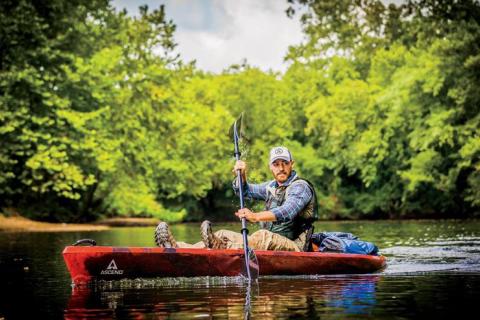
Kayak fishing is lots of fun but in many cases it can be dangerous because of the creatures around you. These are few of the most dangerous creatures you could meet while kayak fishing with a few tips to help you avoid a possible attack.
 Sharks
Sharks
If you are in brackish water or salt water, chances are there are sharks around. Most of the time they just cruise around unseen but occasionally one will get curious and come to visit close up. When this happens understand that staying calm is key. A shark will bump a kayak to test if it is another animal or possibly food.
On a rare occasion it might test a kayak out with a bite. This is a very rare occurrence. A shark, whether bumping or biting a kayak very quickly discovers the plastic isn’t something it wants to eat and moves on. Sharks are mainly after your bait, or the fish you are reeling in.
![]() Extra Tip: The biggest help in avoiding a shark's curiosity is to keep your arms and legs inside the kayak at all times and don’t leave fish on a stringer attached to your kayak.
Extra Tip: The biggest help in avoiding a shark's curiosity is to keep your arms and legs inside the kayak at all times and don’t leave fish on a stringer attached to your kayak.
 Stingrays
Stingrays
Stingrays are just about everywhere in saltwater and are especially present in the summer. If you happen to hook one, use a long hook remover and be wary of the tail. A stingray’s barbs are serrated and covered in a mucus like substance that will cause a bad infection. Catching them isn’t the most dangerous time you come into contact with one. Getting in and out of a kayak while in the water, such as wading, is when most people get hit.
A couple of things that can help avoid this are good wading boots paired with ray guards and shuffling your feet at all times. Shuffling will scare the rays away without alerting them to strike (like stepping on them does). A good pair of boot and guards protects you in case you do happen to step on one.
![]() Extra Tip: Flipping a stingray upside down to remove the hook is often helpful to calm the fish and get better access to the mouth.
Extra Tip: Flipping a stingray upside down to remove the hook is often helpful to calm the fish and get better access to the mouth.
 Snakes
Snakes
Snakes are in freshwater and saltwater and vary in temperament and aggressiveness. The most dangerous time to be around snakes is during breeding season. Snakes become territorial in spring and early summer as they are posturing and protecting.
Usually a couple of slaps in the water will detour a snake headed your direction. If not, leave the area quickly. For the most part, snakes are disinterested and prefer to stay where they are at.
![]() Extra Tip: Keep an eye out in overhanging trees that are low to the water.
Extra Tip: Keep an eye out in overhanging trees that are low to the water.
 Beavers
Beavers
While beavers aren’t in all freshwater bodies, they do inhabit enough waterways to warrant a warning. The beaver is portrayed as cute and cuddly but can get territorial aggressive near their dams, especially when they have young.
A beaver will warn you before becoming aggressive most times with a loud tail slap. Beavers do use thier teeth to chop wood and will bite with extreme pain when they feel trapped. They will often circle you, trying to get a bead on whether you mean them harm. Usually moving away from the area is enough to calm them but you may need to slap the water with your paddle a few times to avoid a closer visit.
Alligators
For the most part, alligators get a bad rap. Like many of the animals on this list, alligators with young are aggressive. If you hear a hiss from one or a low rumble it is time to vacate the area. An alligator will charge to protect its area and/or young. Most of the year however, an alligator is content to swim by or even lay sunning on a beach while you pass by. Use caution when you are around alligators but for the most part, they don’t care that you are there.
![]() Extra Tip: A few cautionary rules never hurt especially where safety is a concern. First and formost, you should always leave alligators alone, don't tease or agitate them.
Extra Tip: A few cautionary rules never hurt especially where safety is a concern. First and formost, you should always leave alligators alone, don't tease or agitate them.
1. Stay back from overgrown shorelines, if there is a lot of cover, you should assume there's an alligator near. Give them plenty of room.
2. Don't feed the alligators.
3. Do not get too close to any alligator.
4. Don't swim or wade where alligators are. Best times to avoid are dusk, dawn and night when they feed.
5. Be cautious in the spring during mating season. During this time big alligators can become more territorial
- 15040 views

